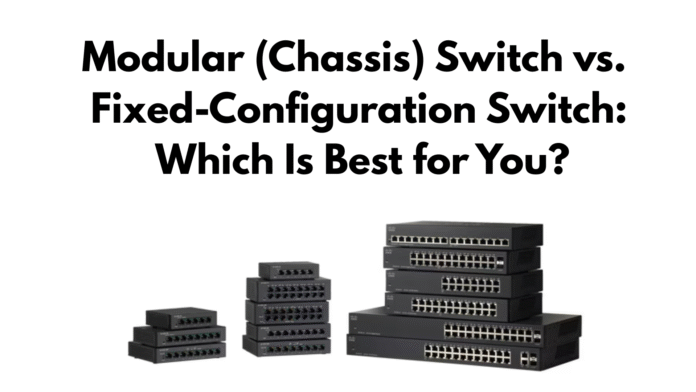In moment’s high- demand network surroundings, choosing between a modular (lattice) switch vs. fixed- configuration switch can significantly impact your structure’s scalability, cost, and performance. Whether you’re upgrading a data center or expanding a branch office, it’s critical to understand the differences between these two switch types. At Jazz Cyber Shield, we offer 100 new and clean periodical networking outfit to help you make a future-ready IT terrain.
What’s a Modular (Lattice- Grounded) Switch?

A modular switch, also known as a lattice switch, provides a largely flexible networking result. Unlike fixed- configuration switches, it allows you to add modules (line cards, power inventories, administrators) as your requirements grow. This design is ideal for large enterprise networks, data centers, and service providers.
Also, you can mix and match different module types, which enables customization for colorful performance conditions. For illustration, if one department needs 10G uplinks and another requires 40G, a lattice- grounded switch can handle both efficiently.
What’s a Fixed- Configuration Switch?

In discrepancy, a fixed- configuration switch comes with a set number of anchorages and features out of the box. While it lacks the expandability of a modular switch, it excels in simplicity and cost- effectiveness. generally used in small to mid-sized businesses, these switches are easy to emplace and manage.
Also, newer fixed switches offer advanced layer 3 routing, PoE, and mounding capabilities features once exclusive to lattice switches. Thus, for networks that do not anticipate rapid-fire expansion, fixed- configuration switches give excellent value without immolating performance.
Key Differences Between Modular and Fixed Switches
Understanding the modular vs. fixed switch comparison can guide your purchase opinions more effectively. First and foremost, modular switches offer scalability and redundancy, which fixed switches can not match. Secondly, while modular systems bear a advanced original investment, they reduce long- term costs by minimizing time-out and unborn upgrades.
On the other hand, fixed switches are ideal for static or low- growth surroundings. Their compact design saves rack space, and they frequently have lower power consumption, which is another consideration for energy-conscious businesses.
Which One Should You Choose?
Eventually, the right switch depends on your business needs. However, modular switches offer the future- proofing you need, If your network must support thousands of endpoints. Again, if your terrain is lower and doubtful to change dramatically, a fixed- configuration switch will serve you well.
likewise, numerous IT directors combine both options — using lattice switches at the core and fixed switches at the edge. This mongrel approach balances performance, cost, and inflexibility, especially when stationed with dependable brands similar as Cisco, Juniper, and HPE.
Why Buy from Jazz Cyber Shield?

At Jazz Cyber Shield, we understand the significance of secure tackle. That’s why all our products are 100 new and come with clean diurnals, icing genuine quality and long- term trustability. Whether you are looking for modular enterprise switches or affordable fixed- configuration models, our expert platoon is ready to help you make the stylish choice.
Final studies
Choosing between a modular switch and a fixed- configuration switch involves assessing your current and unborn network requirements. While both offer significant advantages, your decision should align with your scalability conditions, budget, and network complexity. At Jazz Cyber Shield, we make that decision easier by furnishing top- league networking gear at unstoppable prices with clean diurnals and guaranteed authenticity.



